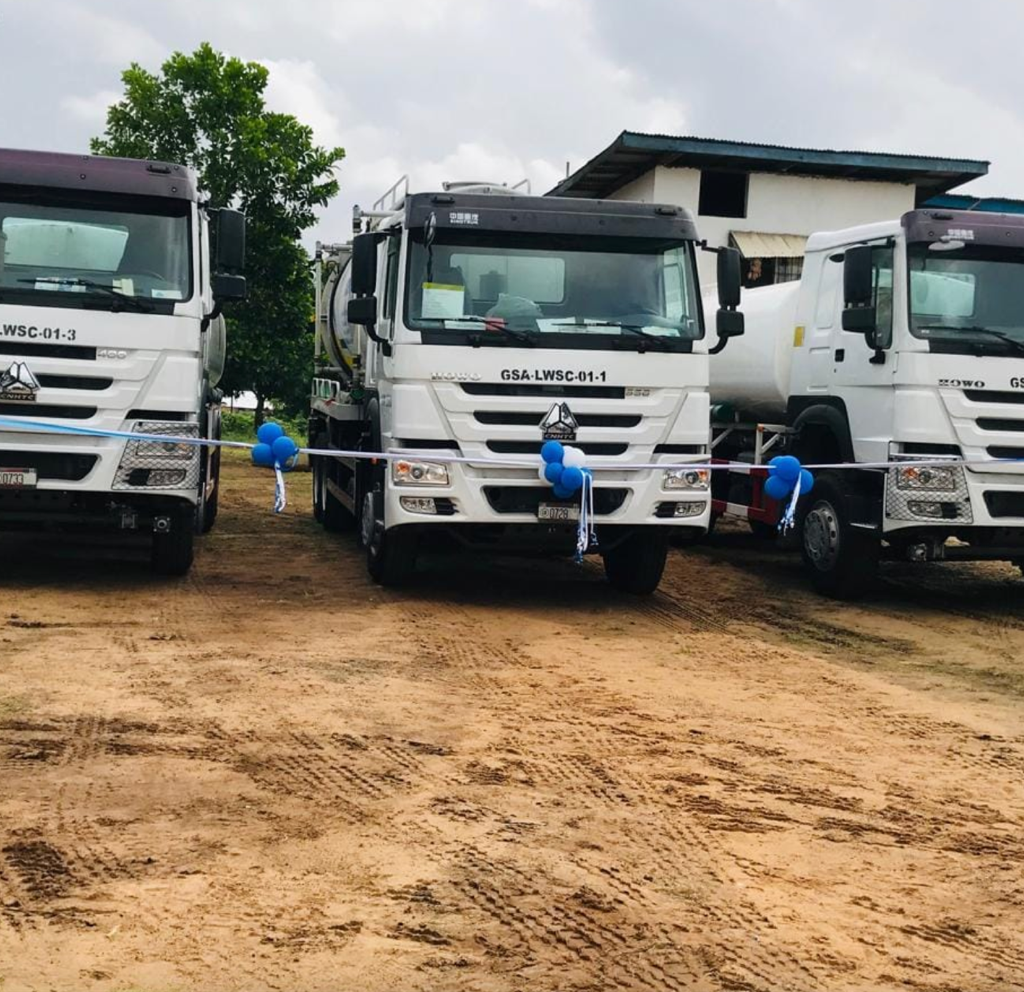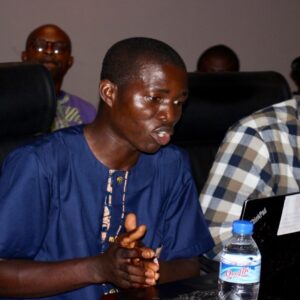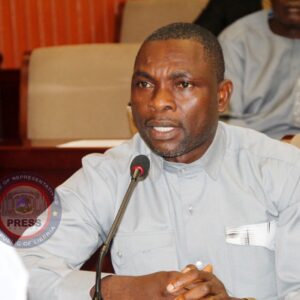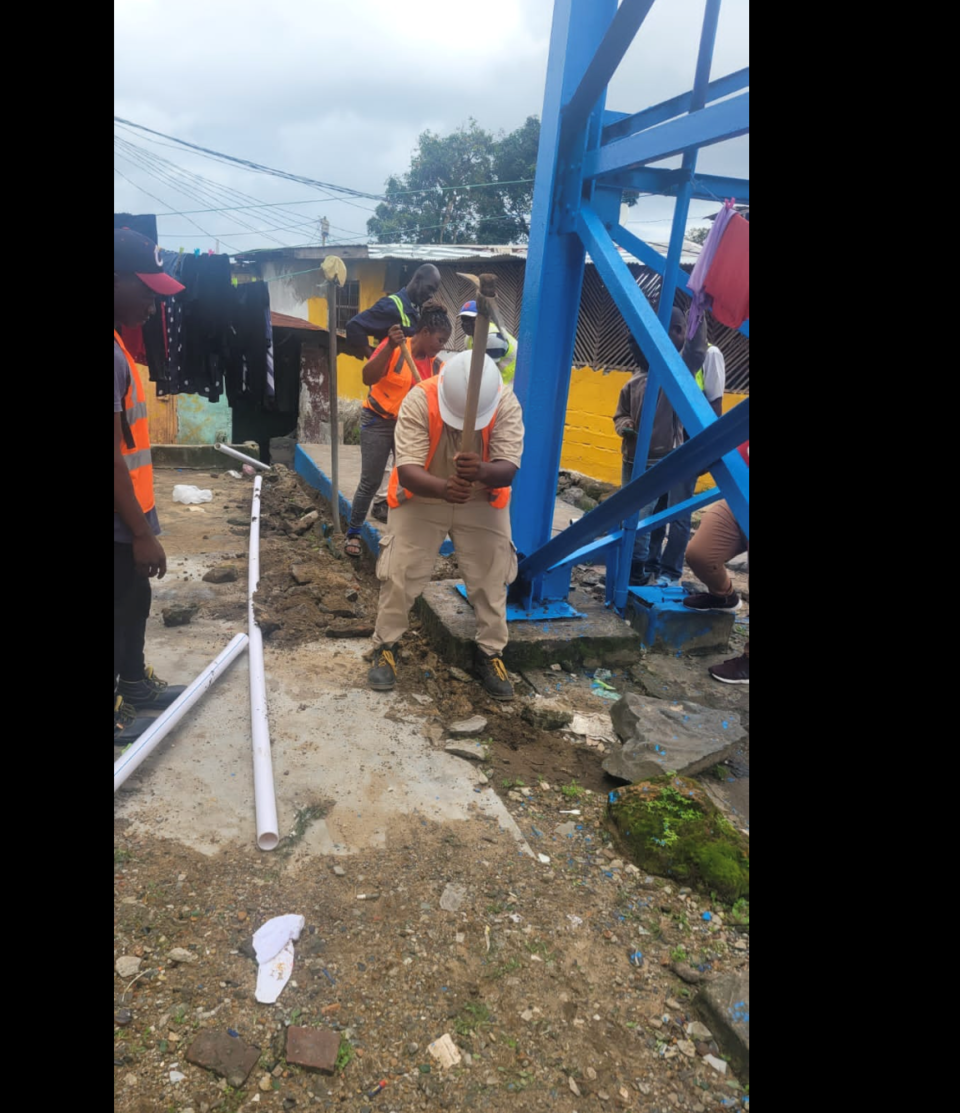PHOTO: Workers of the Liberia Water & Sewer Corporation (LWSC), connect neighborhoods with safe drinking water. (LWSC)
By Aaron Salloe
MONROVIA, Liberia—When he assumed the leadership of Liberia five months ago, one of the first things that President Joseph Boakai set out to do was to put in motion his 100-day deliverables. Notable among such commitments were the ones for Water Sanitation and Hygiene (WASH)—an issue experts say is critical to the safety, survival, health, and overall wellbeing of the citizenry.
Key among the president’s commitments was to “connect 250 households to the public water supply network,” and the “purchase of required quantities of chemicals necessary for maintaining clean water supplies.” President Boakai did also promise that his administration would ensure the “deployment of sewage desludging trucks with rodding equipment and appropriate trained staffs.” But how did his government fare in its first 100 days (about 3 and a half months) in office from the perspective of WASH? This article details the Boakai-led administration’s 100-day plans for WASH and shares insight on what needs to be done to improve the sector.
Anthony Myers, the Deputy Finance Minister for Fiscal Affairs was emphatic about the government’s achievements—telling a Liberian government’s weekly press conference at the Ministry of Information on Capitol Hill this month that, “95% water reservoirs in Paynesville and Monrovia were repaired and active.”
Aside from that press conference, the government also released its “100-day action plan assessment report,” saying that, “cleaning of sewage is at 20% and is anticipated to significantly increase,” and that the “the Liberia Water and Sewer Corporation (LWSC), has commissioned four additional sewer tankers to facilitate the cleaning of sewerage across Monrovia and its environs.” The government said it did spend more than $US23.4 million on all of its deliverables. But the report made no mention of how much was spent on WASH.

Three of the four sewer tankers the Liberia Water & Sewer Corporation (LWSC) commissioned as part of the government’s 100-day deliverables. (LWSC)
Here’s a snapshot of the government’s achievements for WASH according to its 100-day deliverables assessment report:

In addition to the highlighted enumerated achievements, the government through the Liberia Water and Sewer Corporation (LWSC), commissioned a one-million gallon reservoir located on Broad Street in May to connect many people in central Monrovia. Mohammed Ali, the corporation’s Managing Director, told a commissioning ceremony that the project cost $US41,000. There’s been no information from Ali or the government about the number of homes the company supplied water on the Bushrod Island and in Kakata.
The government’s 100-day WASH performance has been greeted with praises and criticisms from key WASH actors. Timothy Kpeh, Executive Director of a leading pro-WASH advocacy Civil Society Organization —United Youth for Untied Youth for Peace, Education, Transparency and Development in Liberia—graded the government’s performance as “fairly well” on the overall, but “poor” in some areas, including what he says is its failure to “clean all sewage spillage in central Monrovia, improve water supply to Bushrod Island, restore pipe-born water to Kakata [Margibi County] [and] clean [the cities of] Monrovia and Paynesville of dirt and filth.”
WASH is a key component of the ARREST(Agriculture, Roads, Rule of law, Education, Sanitation and Tourism) agenda of the Boakai administration. President Boakai even talked about the issue in his inaugural address in January, specifically highlighting the importance of sanitation.
Unveiling of 100-day deliverables has become a tradition for leaders globally. While he interposes no objection to the president’s decision to follow such a tradition, Mr. Kpeh
says the government’s allocations to WASH in the 2024 national budget is negligible and raises questions about the sincerity of the government’s commitment to prioritizing WASH. The 2024 national budget is in the tune of $US738,859,827.
Of that amount, $US891,200 has been allotted to the WASH Commission in the recently approved budget. Of that amount, $US641,200 or 71.94 percent is allocated to “compensation of employees,” while $250,000 or 28.05 percent is set aside for “goods and services” or operational costs. The amount of $US473,926 is budgeted for the “restoration of water and cleaning up of sewage spillage” by the LWSC. Only $US5,000 or 0.01 percent is allotted to “water and sewage” against the $US35,545,306 budget line of the Ministry of Public Works. 35,545,306 or 8.07 percent of that amount is for the “compensation of employees.” There are no explanations in the national budget about whether the money was appropriated for WASH.
But Kpeh, also head of the WASH Legislative Secretariat, says he’s disappointed about the appropriations because of the increasingly growing demands for investments in the critical sector. In April, Kpeh facilitated a gathering of lawmakers and donors, including WaterAid, pro-WASH advocates and officials of ministries and agencies involved with the sector. The goal was to make a case for more funding for WASH. But Kpeh says he finds it unbelievable that effort largely went unnoticed.
“We were expecting at least 3 to 5% of the national budget to be allocated to WASH,” says Kpeh. “Until the government can improve financial contributions to WASH, we are yet to address WASH as a serious matter. Today, it is reported [by the World Bank] that Liberia loses 17.5 million USD while over 3000 persons die yearly due to poor WASH services. Liberia will not meet the SDG 6 without prioritizing WASH.”

Timothy Kpeh, Executive Director of United Youth for Peace, Education, Transparency and Development in Liberia at a WASH accountability forum. (Kpeh)
Maryland County Representative, Anthony F. Williams chairs the House Committee on WASH and the Environment. He agrees that more funding could have come to the WASH sector with the backing of the legislature. Equally so, there were some issues that may have influenced this condition. However, there were some conditions that also affected the situation.
For example, “The commission was still in a state of administrative transition, marked by a little bit of tension between the old and new administration. That situation did not give any side [to the crisis] the opportunity to come before the committee on Ways, Means and Finance to present their 2024 plans for the sector,” says Representative Williams. “So that was the reasons for which the national legislature could not act.”
He continues, “actors in the sectors are right to criticize because they are juggling from pass “I commit to work with the chairman at the WASH commission and make sure their plans are submitted in time to the legislature for early lobby for possible increment starting with the 2025 budget.”

Anthony F. Williams chairs the House Committee on WASH and the Environment. (House press bureau).
The government’s 100-day WASH deliverables assessment report makes no mention of rural Liberia, where “60% of people engage in open defecation,” according to PLOS Water, a think tank.
A 2019 report by Unwater, said there were “limited services” provided to the population in terms of WASH. The report named Liberia as one of 20 countries and territories that “reported a funding gap of 61% between identified needs and available funding to reach national WASH targets,” warning that “insufficient funding remains a serious issue for countries to achieve their national targets.”
Over the years, WaterAid has been helping to address or mitigate such problems—funding many waterpoint projects, particularly in Montserrado and Grand Cape Mount Counties. WaterAid has constructed a total 60 water points across Liberia since 2009 as a means of helping to address the country’s water and sanitation crisis. WaterAid has also funded numerous initiatives of the Liberian government, including a retreat in March for the WASH Legislative Caucus, and the budget gathering that Kpeh facilitated.
“According to a 2020 UNICEF, WHO and JMP report, 75 percent of the population in Liberia had access to a basic level of drinking water, including 85 percent of residents in urban areas and 64 percent of residents in rural areas. The issue is particularly affecting rural residents and leading to WASH related diseases and deaths, especially among children. A new report just this June 2024 released by Action Contre La Fam says, “37% of deaths in children under five are due to pneumonia or diarrhea, both of which are affected by water, sanitation and hygiene.” The report says the problem is even worse in rural areas, warning that the “Lack of access to drinking water and adequate sanitation makes families particularly vulnerable to water-borne diseases.”
Yahyonyon Town in Todee District, rural Montserrado County, Liberia, is one of the many areas in rural Liberia that experienced such issues until WaterAid intervened to help eliminate WASH related diseases, including diarrhea.

